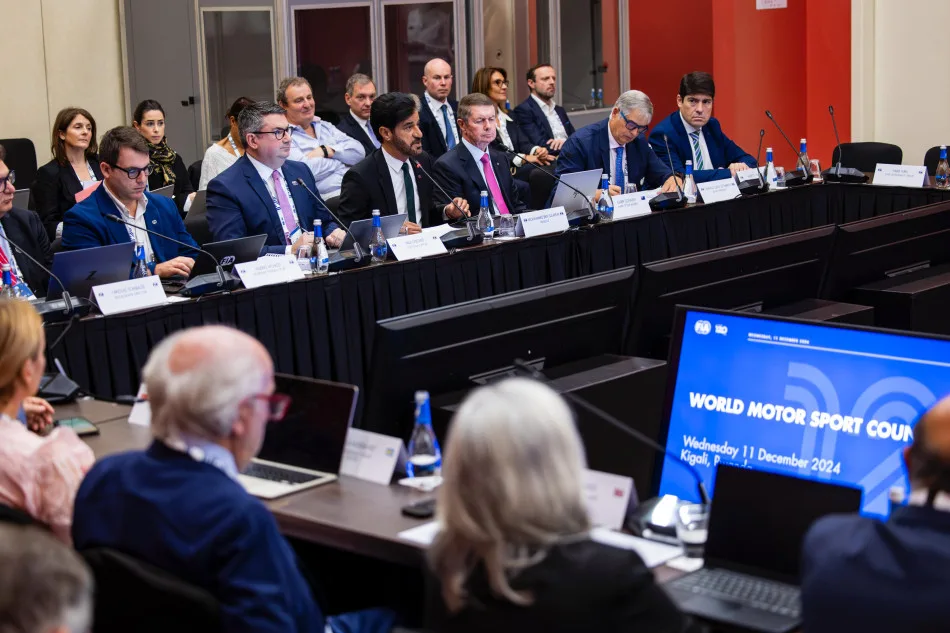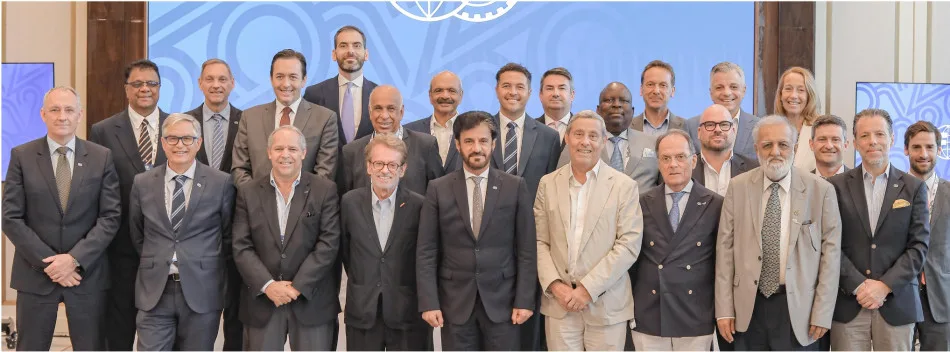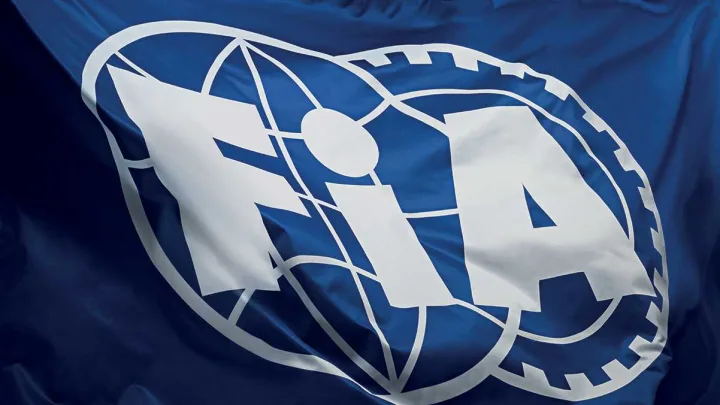WORLD MOTOR SPORT COUNCIL

The World Motor Sport Council (WMSC) has responsibility for all aspects of international motor sport and decides on calendars, rules, regulations, safety and development of motor sport at every level from Karting to Formula One.
In 2024, the WMSC met four times. The first meeting was held virtually from the FIA Offices in Geneva at the end of February, a few days before the beginning of the FIA Formula One World Championship season. During the meeting, the FIA President, Mohammed Ben Sulayem, welcomed the new Presidents and Chairpersons of the Commissions and Committees and highlighted the fact that four newcomers were women. He said: “the FIA is dedicated to growing the number of women in senior posts within the FIA, and these appointments are an important step in our efforts to achieve this”. A roadmap for the future of WRC, based on the work of the WRC Working Group established by the FIA President, was also approved by the WMSC members. Furthermore, the Council upheld the new FIA vision for the future of hydrogen fuel technology.
The World Council’s second meeting took place during the FIA Conference Week in Samarkand, Uzbekistan, in June. There, the FIA President announced a new Karting strategy to be launched in 2024. He reaffirmed the strategic partnership between the FIA and the Formula One Commercial Rights Holder for a long-term prosperity of the sport. The 2026 Formula One Sporting and Technical Regulations were presented to the Council and approved in the following weeks. The WMSC also agreed for technical stability for the 2025 and 2026 WRC seasons.
One week before the FIA Motorsport Games in October, the WMSC met for the third time virtually from the FIA Offices in Paris. The FIA President announced that the Affordable Cross Car design blueprints for the Level 2 category had been delivered to 147 Member Clubs of the FIA, just four months after its announcement. A significant update for the 2026 Formula One Regulations were presented and approved by the World Council. The WMSC also endorsed a major update to Appendix K to the FIA International Sporting Code (ISC), allowing historic cars from 1991 to 2000 – including iconic Formula 1, Le Mans Prototypes, GT, touring, and rally cars – to compete in FIA Championships from 2025, bringing a celebrated era of motor sport back to the track. In addition, the World Council unanimously approved the new FIA Safeguarding Policy, developed in collaboration with ASNs and global sporting bodies, to ensure a safe, inclusive, and accountable environment in motor sport, protecting participants from abuse, harassment, and exploitation.
The final meeting of 2024 was held in December, in Kigali (Rwanda), during the FIA General Assemblies week. Reflecting on the past year, the FIA President emphasised that the FIA had strengthened its leadership and its finance, celebrated 120 years of innovation, and reinforced its partnership with Formula 1, marking a record-breaking 2024 season while preparing for an 11th team on the grid in 2026. The WMSC approved the 2027 FIA WRC Technical Regulations, prioritising cost reduction, flexibility, and sustainability by allowing diverse car designs and powertrain solutions, with an initial focus on sustainably-fuelled combustion engines. A Global Karting Plan was also presented to the World Council, with a view of making Karting more accessible worldwide by creating a clearer entry pathway with phased implementation starting in 2025. Furthermore, the WMSC approved the creation of an FIA Esports Code (Appendix E to the ISC) – the first such framework created by a global sporting federation.
World Council for Automobile Mobility and Tourism

In 2024, the World Council for Automobile Mobility and Tourism (WCAMT) met twice — in June at the FIA Conference in Samarkand, Uzbekistan, and in December during the FIA General Assemblies week in Kigali, Rwanda — to advance the FIA’s mobility agenda with and for FIA Members.
The World Council’s discussions focused on key initiatives including the FIA Road Safety Index, the Helmet Wearing Initiative, and Safe Mobility 4 All and 4 Life. Members reviewed regional development efforts, and heard about the first edition of the FIA Innovation Challenge and FIA University programmes.
In December, WCAMT members heard from FIA Secretary General for Automobile Mobility, Willem Groenewald, on his 2025 vision to elevate Member perspectives and deliver targeted development tools. The Council also reviewed the 2025 work plans of the FIA Mobility Services and Policy Commissions.
Both meetings reaffirmed the FIA’s strategic focus on road safety, sustainability, accessibility, innovation, regional empowerment and strong Member engagement — with the World Council members committed to delivering impact through shared vision and global cooperation.
FIA COMMISSIONS AND COMMITTEES
In 2024, FIA Members continued to play a central role in shaping the direction of international motor sport and mobility through their participation in the FIA Commissions and Committees. This Member-driven structure reinforces the FIA’s commitment to be led by its Member Clubs. The FIA Commissions and Committees benefit from their on-the-ground knowledge, helping to ensure that global initiatives are relevant across different regions.
The list of Presidents of FIA Commissions and Committees is available in the Governance section of the report.
Sport Commissions and Committees
The World Motor Sport Council (WMSC) is assisted by World Championship Commissions, WMSC Committees and Commissions (attached to such WMSC Committees). Commissions may be assisted by Working Groups, if necessary.
All FIA Sport Commissions and Committees are mainly composed of elected representatives from FIA Member Clubs, ensuring that strategic and technical decisions reflect the needs and realities of national motor sport communities.
Further details on the work carried out through the FIA Sport Commissions and Committees can be found in the Sport Championships, Inclusion and Respect, and Sustainable Actions sections of this report.
FIA Mobility Policy Commission
The Mobility Policy Commission advances FIA and Club advocacy by guiding the development and implementation of programmes that strengthen Clubs’ influence in key areas, such as policy formulation, consumer protection, public campaigning, and lobbying.
It ensures that FIA Members and Regions are equipped with the tools and resources to advocate for their members’ interests, shape public policy, and drive positive community impact.
In 2024 The Commission ensured guidance on all FIA advocacy programmes, with particular focus on research.
FIA Mobility Services Commission
The Mobility Services Commission (MSC) acts as an incubator, driving income-generating initiatives designed to boost member acquisition and retention at both regional and global levels. Focused on innovation, its goal is to spread best practice, foster mentorship, and promote cross-regional collaboration across the FIA network, empowering Clubs and Regions for sustainable growth.
Following the development in 2023 of a strategic framework based around four pillars – Involve Regions in the Commission’s Work; Adopt a Data-Driven Approach; Create Communities of Practice, and Share with the Network – the Commission, in 2024, continued to pursue these four key missions through the creation of dedicated Working Groups, which includes MSC members, Regional Coordinators, and Club Experts.
These working groups aim to enhance regional impact, facilitate cross-regional collaboration, and identify and champion projects with the potential for further development and support through the FIA Regional Development Programme.
In 2024, the Working Groups focused on:
- Driver Training Practice in Latin America
- Tourism Opportunities in Asia Pacific
- Drone Solutions for Club Diversification
- Innovative Services
International Historical Commission and Founding Members Club
Further details on the work carried out through these Commissions can be found in the Preserving our Heritage section of this report.
